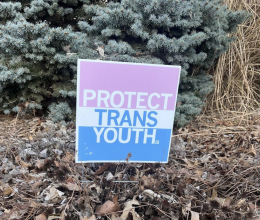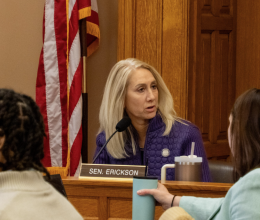
5 Facts About Trans Athletes in Kansas
5 Facts About Trans Athletes in Kansas
For the third year in a row, Kansas legislators have launched a discriminatory effort to ban transgender girls and young women from K-12 and collegiate sports in Kansas, in an effort to solve a “problem” that simply does not exist.
As in every previous legislative session, the arguments that proponents of this year’s sports ban rely on false assumptions about biology, athleticism, and gender. Proponents claim banning transgender girls and women would protect the cisgender girls and women who play sports—but its adoption would have the opposite effect, opening all girls and women up to unnecessary scrutiny and potentially invasive examinations just to be able to play sports in Kansas. It would ultimately needlessly demonize and harm some of the most vulnerable Kansas kids.
Believing and perpetuating myths and misconceptions about trans athletes is harmful. Be sure to ignore the myths, remember the facts, and protect trans athletes in Kansas.
- Despite the fact that trans people of all ages have been participating in sports as their true selves for years, there is simply no evidence of categorical dominance by trans athletes at any level of competition—across the country or in Kansas. In fact, proponents of bills like HB 2238 have yet to provide a single example of a trans athlete who has caused any harm in Kansas athletics, and only two students in Kansas would actually be impacted by the most recent bill.
- Excluding trans girls and women from competing in women’s sports harms all girls and women seeking to play sports in Kansas. Rather than “protecting” girls and women, policies like that included in HB 2238 would invite gender policing that could subject any girl to invasive accusations of being “too masculine” or “too good” at their sport to be a “real” girl. Additionally, research shows that states with policies like HB 2238 actually have decreased participation by all girls in sports.
- Including trans girls and women in women’s sports benefits all girls and women seeking to play sports in Kansas. Research shows that states with trans-inclusive sports policies—allowing trans girls and women to play women’s sports—have consistent or increased participation by all girls in sports. Additionally, inclusive policies lead to improved mental health, better grades, and increased safety for trans youth.
- Trans athletes do not have a universal advantage in sports. In fact, there are many social and physiological factors that impact success in sports. The notion that trans girls have an automatic advantage in sports has no merit and is based on two false premises—the false idea that trans girls are really boys, and the false idea that being assigned “male” at birth gives a person an unmitigated competitive advantage in all sports. Trans youth vary in athletic ability, just like cisgender youth—physical characteristics like size, strength, and athletic ability vary from person to person, regardless of whether they are cisgender or transgender. And success in any given sport depends on a myriad of factors outside of these physical characteristics, like access to good coaches and facilities, financial status, ability to practice, level of self-discipline, and more.
- There are real issues with gender parity in sports when it comes to funding, resources, pay equity, and more— but banning trans girls and women from playing women’s sports in Kansas does nothing to address those real problems. Instead, HB 2238 singles out one group of girls and women for different treatment and bans them from playing sports as themselves—something Title IX was explicitly adopted to prevent.
Related content


LGBTQ+ Advocacy Resource Hub
December 14, 2022
Beyond the Bills event seeks to open conversation about anti-trans...
March 25, 2025
ACLU of Kansas, Loud Light to share info on anti-trans bills moving...
March 24, 2025
House recommends approval on bill on student preferred names, pronouns
March 11, 2025
Lawrence couple feels impact of new federal anti-trans policies
March 5, 2025
Kansas pronoun bill sparks bipartisan concerns of turning ...
February 19, 2025